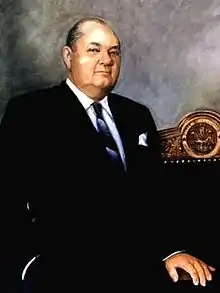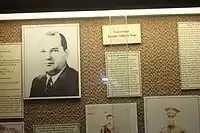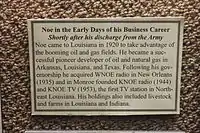James A. Noe
James Albert Noe Sr. (December 21, 1890 – October 18, 1976) of Monroe served for three and a half months as the 43rd Governor of Louisiana after the death of Oscar K. Allen on January 28, 1936.
James A. Noe | |
|---|---|
 | |
| 43rd Governor of Louisiana | |
| In office January 28, 1936 – May 12, 1936 | |
| Lieutenant | Vacant |
| Preceded by | Oscar K. Allen |
| Succeeded by | Richard W. Leche |
| 37th Lieutenant Governor of Louisiana | |
| In office 1935–1936 | |
| Governor | Oscar K. Allen |
| Preceded by | Thomas C. Wingate |
| Succeeded by | Earl K. Long |
| Member of the Louisiana Senate | |
| Personal details | |
| Born | James Albert Noe December 21, 1890 Evans Landing, Indiana, U.S. |
| Died | October 18, 1976 (aged 85) Houston, Texas, U.S. |
| Resting place | Emma Lee Short Memorial Chapel Mausoleum of Mulhearn Memorial Park Cemetery in Monroe, Louisiana |
| Political party | Democratic |
| Spouse(s) | Anna Gray Sweeney Noe (married 1922–1972, her death) |
| Children |
|
| Residence | Monroe, Ouachita Parish Louisiana |
| Alma mater | Public schools |
| Profession | Broadcaster; Farmer; Oilman |
| Military service | |
| Allegiance | |
| Branch/service | |
| Rank | First Lieutenant |
| Battles/wars | World War I |
Background
Noe was born in the community of Evans Landing in Harrison County, Indiana, to John M. Noe and the former Belle McRae. He also lived as a child in the area of West Point in Hardin County in Kentucky. His education was limited to county schools. In 1971, he received an honorary LL.D. degree from the University of Louisiana at Monroe, then known as Northeast Louisiana University, to commemorate his lifetime achievements. He served in World War I as a first lieutenant with the 369th Infantry in France. He relocated to Louisiana and garnered a fortune as an independent oilman, both as producer and overriding royalty owner in Texas, Arkansas, and Louisiana.
Political career
Noe was elected to the state Senate, District 29 (Ouachita and Jackson parishes). He became a legislative floor leader at the request of Governor Huey P. Long Jr. He was chosen president pro tempore of the state Senate and succeeded to the governorship to finish out Allen's term because the sitting lieutenant governor, John B. Fournet, had resigned on his election to the Louisiana Supreme Court.
During Noe's brief tenure, he appointed Huey Long's widow, Rose McConnell Long, to finish Long's seat in the U.S. Senate. He also worked toward getting federal money for state highways and establishing a state welfare office. Noe thereafter returned to the state Senate and served until 1940, when he launched his own gubernatorial bid.
In the fall of 1936, Noe joined the Reverend Gerald L. K. Smith, a former advisor to Huey Long, in a tour opposing Governor Richard Leche's sales tax on luxury items, revenue that the governor claimed was essential for the state share of the new Social Security program. Noe charged that Leche "sold out to Roosevelt to finance Social Security.[1]
In 1940, both he and sitting Governor Earl Kemp Long lost to Sam Houston Jones of Lake Charles in the pivotal Democratic primary. Charles E. McKenzie, who later went on to serve as a Representative in Louisiana's 5th Congressional District was named as the campaign manager for Noe.[2] Noe and Earl Long later buried their differences. A Noe confidant, state Senator Joe T. Cawthorn of Mansfield, switched to the Long faction and undercut the Jones administration through his position as chairman of the Senate Finance Committee.[3]
In 1959, Noe and Long ran as an intraparty ticket for governor and lieutenant governor, respectively. Noe finished fourth in the primary and stood with DeLesseps Story Morrison, then the mayor of New Orleans in the pivotal runoff election against former Governor Jimmie Davis. Earl Long, however, supported Davis because of Long's continuing personal dislike of Morrison.[4]
Three Louisiana State University scholars describe Noe's last campaign, accordingly:
Noe had always been a Huey Long stalwart. Noe is a wealthy businessman from Monroe ... who carries a strong streak of Populist liberalism in his appeals. He came out of political retirement at the age of sixty-nine to make this race, and there is no reason to doubt the sincerity of his claim that he ran to redeem the name 'Long' and to try to prevent the repeal of the programs consistently fostered by the Longs. The strongest asset in Noe's campaign was the presence on his 'ticket' of Earl Long himself as a candidate for lieutenant governor. That Long should be regarded as an asset rather than a liability before the campaign was over when so many had earlier classified him as a has-been is ample testimony to the rather awesome respect which his candidacy for any elective office seemed to evoke among friends and enemies alike.[5]
The Noe-Long combination was soundly repudiated by the state's Democratic voters, who instead brought back the administration of Jimmie Davis, who first served from 1944 to 1948. Noe finished fourth in the 1959 gubernatorial primary with 97,654 votes (11.6 percent), behind state Senator William M. Rainach, the third-place candidate. Long lost out to conservative former Speaker of the Louisiana House of Representatives Clarence C. "Taddy" Aycock of Franklin in St. Mary Parish in south Louisiana.
Noe was part of the Louisiana delegation to the 1968 Democratic National Convention, which met in Chicago to nominate Vice President Hubert H. Humphrey to carry the banner against Richard M. Nixon and George Wallace.[6]
Business success
Noe had much more success in his business ventures than he had in politics. Before his governorship, he founded both WNOE in New Orleans and KNOE in Monroe, both named in his honor. After his governorship, he added WNOE-FM in New Orleans and KNOE-TV and KNOE-FM in Monroe. Though an old populist in political inclination, Noe turned conservative in his last years, as demonstrated in editorials through his radio and television stations. He was particularly critical of the nation's "left-turn" in the 1960s. KNOE broadcast the news report of the legendary Paul Harvey, whom Noe brought to Monroe for a public appearance. Noe also owned and operated farms in his native Indiana, his adopted Ouachita Parish, most notably the Whitehall Plantation, and in rural Tensas Parish adjacent to the Mississippi River.
Family and death
On May 7, 1922, Noe married the former Anna Gray Sweeney (1901–1972). Their children were Gay Noe (born 1923), James Albert "Jimmy" Noe Jr. (1928–2005), and Linda McRae Noe (born 1938).
Jimmy Noe, a prominent New Orleans businessman, inherited the family-owned radio and television stations after his father's death. Noe Jr. turned Republican and supported the GOP gubernatorial nominee David C. Treen in 1972 and was an alternate delegate to the 1972 Republican National Convention that met in Miami Beach to renominate the Nixon-Agnew ticket.


Noe's daughter-in-law, the former Betty Schlesinger (1926–2014), a native of Abbeville in Vermilion Parish, was active in the New Orleans Opera Association, the Women's Opera Guild, the New Orleans Ballet Association, the Louisiana Arts Council, and the Louisiana State University Foundation. U.S. President Ronald W. Reagan appointed her to serve on the advisory committee of the Kennedy Center in Washington, D.C. She was a Knight of the Equestrian Order of the Holy Sepulchre of Jerusalem and a recipient of the Order of St. Louis. Jimmy Jr. and Betty Noe, who married in 1955, had five children, Lisa Deane (Tenny), James Noe, III, Erin May (Chet), George Noe (Elizabeth), and Claire Koch (Josh).[7]
Noe died in Houston, Texas, from complications from a heart condition. He is entombed alongside his wife in the Emma Lee Short Memorial Chapel Mausoleum of Mulhearn Memorial Park Cemetery in Monroe. The University of Louisiana at Monroe Alumni Center is named for Mrs. Noe.
Notes
- "Smith, Noe to Speak Here Saturday: Pair Will Stop in Minden in Tour of State", Minden Signal-Tribune, October 20, 1936, p. 1
- "Charles McKenzie Manager of Noe's Race for Governor" (Main Edition · Page 7). The Town Talk (Alexandria, Louisiana). October 9, 1939.
- Sanson, Jerry Purvis (1999). Louisiana During World War II: Politics and Society, 1939-1945. Baton Rouge, Louisiana: Louisiana State University Press. pp. 83, 84, 88. ISBN 0-8071-2308-0. Retrieved October 28, 2014.
- "Noe Gives Support to Morrison", The Shreveport Times, December 10, 1959, p. 1
- William C. Havard, Rudolf Heberle, and Perry H. Howard, The Louisiana Elections of 1960, Baton Rouge: Louisiana State University Studies, 1963, pp. 38-39
- "Delegates to Democratic National Convention Listed, July 24, 1968". reggiefamilyarchives.com. Archived from the original on April 2, 2015. Retrieved July 7, 2013.
- "Betty S. Noe obituary". New Orleans Times-Picayune. Retrieved June 20, 2014.
References
- Davis, Edwin Adams (1961). Louisiana: The Pelican State. Baton Rouge: Louisiana State University Press. LCCN 59:9008.
- "James Albert Noe," A Dictionary of Louisiana Biography, Vol. 2 (1988), p. 607.
- Who's Who in America, 1976–77
- Miriam G. Reeves, The Governors of Louisiana
- James A. Noe obituary, New Orleans Times-Picayune, October 19, 1976
External links
- Obituary of James Noe Jr. from Times-Picayune
- State of Louisiana - Biography
- Cemetery Memorial by La-Cemeteries
- Arcane Radio Trivia Biography
| Political offices | ||
|---|---|---|
| Preceded by Thomas C. Wingate |
Lieutenant Governor of Louisiana 1935–1936 |
Succeeded by Earl K. Long |
| Preceded by Oscar K. Allen |
Governor of Louisiana January 28, 1936-May 12, 1936 |
Succeeded by Richard W. Leche |
